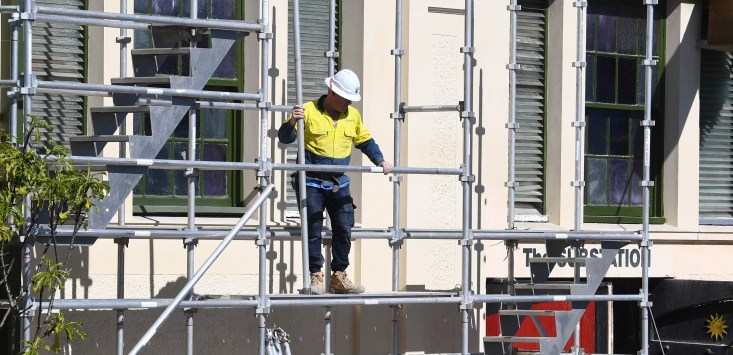
Source: AAP Image/Jono Searle

Source: ASIC
Big names to collapse over the last financial year includes Porter Davis, which left around 1,700 homes unfinished and owed creditors an estimated $147 million when it appointed liquidators in March.
But ASIC’s daily tally of company collapses is dotted with smaller firms, many of which have been squeezed out of business by uniquely difficult conditions.
Construction slowdown hurting businesses and homebuyers
Contributing factors include COVID-19 fiscal support, including the Homebuilder grant, which offered up to $25,000 in grants for new home construction and renovation works.
The massive uptake of that scheme flooded the construction sector with new projects.
However, lingering supply chain shortages pushed up the price of materials like steel and timber, and labour market tightness made the fight for workers more competitive, making it harder for builders to break even on contracts they signed before costs rose.
Speaking to SmartCompany, construction industry professionals at small and boutique firms say the rapid boom and bust has exposed deep flaws in the sector.
Tim Walker, managing director of TCON, a small high-end home builder in Melbourne, said he has watched four comparable firms go under in the past week alone.
In his view, long-held rules around when builders can be paid for their work are not compatible with unavoidable supply chain blowouts.
In Victoria, builders may be paid a portion of the total build cost once they have completed a home’s base, frame, lock-up (which includes external walls, roofing, and flooring), and fixing (internal details like cladding and shelving).
But Walker said the lead times for crucial assets have blown out.
Some builders are now waiting 12 to 16 weeks for windows, meaning they cannot reach the next official stage of the build to secure a further cash injection.
“They can’t seem to build their jobs fast enough, so they keep getting hit with cash flow dilemmas,” he said.
“They can’t actually access the money because they can’t get to those stages of the project.”
Higher deposits for work a hard sell to clients
Potential alternatives include new rules which would entitle builders to funds after time elapsed, not features completed, Walker said.
For now, TCON is moving ahead with what he calls “early procurement”: locking in prices for labour and construction assets as soon as possible on fixed-price terms.
But contractors taking on new construction jobs are becoming more wary of potential collapses, he added, and are seeking more up-front assurances — another complicating factor for businesses already managing a cash flow squeeze.
Those front-loaded contracts are also a difficult sell for some clients, who may find themselves as unsecured creditors in case of a company collapse.
“You don’t want to pay them too much too early, because as a client, you’re worried that your builder could go under and become insolvent.
“And then your build could cost a lot more because you’ve paid the builder too much.”
Walker said in today’s environment, building quickly is best, even if it costs more up-front.
“If your job slows down to a halt for no reason, you can see the early telltale signs that things aren’t looking good.”
Builders look forward as interest rates rise
Builders and contractors which are currently struggling to find the right labour may benefit from hardships faced by larger firms, owing to what Walker called an “inward” transition of labour from new suburban developments to the metro regions.
“Trade prices are gonna start to stem, and they’re gonna start to slow down a bit,” Walker said.
“They’re gonna be more competitive, they’re not going to be asking as much upfront, because they’re going to want to be winning the jobs that the builders have.”
Today’s pressures may also benefit “builders on the tools”, or small businesses which go without extensive office-based teams and the overheads they may carry.
For builders, rising interest rates could also represent a mixed blessing.
The Reserve Bank of Australia’s cash rate target has surged from just 0.10% to 4.10% in just over a year, pushing the cost of home loans skyward and forcing many would-be homebuyers to reconsider their plans.
New home sales in the three months to May this year were 40% down on the prior corresponding period, the Housing Industry Association said.
“I think [Reserve Bank of Australia governor] Phil Lowe is probably doing a good job” of slowing the runaway demand for new home builds, Walker said, adding that underlying demand for new homes is unlikely to crater and leave builders with no work to complete.
Insolvencies playing “catch up” from COVID-era protections
Although the collapse of small building firms is extremely difficult for their workers and new homebuyers, some industry professionals see the current wave of insolvencies as overdue.
John Winter, chief executive of the Australian Restructuring Insolvency and Turnaround Association, this week said industry professionals should be “alert, not alarmed” about rising insolvency rates.
“Yes, they are up,” he said.
“They are heading to around pre-COVID levels. But we also had to “catch up” with some 15,000 companies propped up by COVID-era stimulus that really weren’t viable.”
Unsustainable businesses calling time on their operations is a good thing, he added, as “broke businesses risk bringing good businesses down.”
Speaking to SmartCompany, other builders expected the wave of insolvencies to clear out underperforming firms, without addressing some of the underlying issues which led to the current construction sector crunch.
Handpicked for you

Inspace raises $6 million to expand AI technologies in commercial real estate




COMMENTS